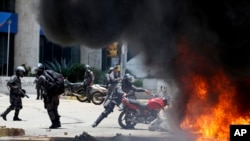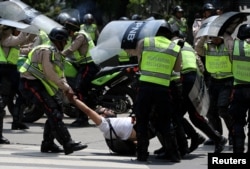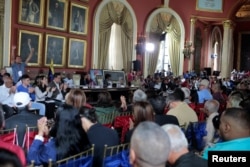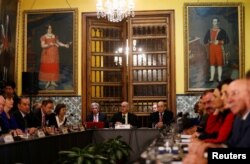The United Nations' human rights office said Tuesday that Venezuelan security forces caused many of the 125 deaths demonstrators have suffered during four months of anti-government street protests, by the "widespread and systematic use" of excessive force.
The U.N. report was made public Tuesday in Geneva, as foreign ministers of 15 Western Hemisphere nations met in Peru about the situation in Venezuela. The political and economic crisis in Caracas and other parts of the country already is spilling over neighbors' borders, with thousands of Venezuelans fleeing the chaos.
The U.N. agency said preliminary results of its investigation show that 46 demonstrators died directly at the hands of Venezuelan security forces, while pro-government armed groups were responsible for 27 deaths; it was not clear who caused the remaining deaths. The Human Rights Office in Geneva promised a more comprehensive version of its report by the end of this month.
Many detainees still held
U.N. human rights commissioner Zeid Ra'ad al-Hussein said more than 5,000 people have been arbitrarily detained in Venezuela since widespread unrest broke out in late March, and over 1,000 of those detainees are still in custody. Another 2,000 protesters have been injured during almost-daily demonstrations.
A spokeswoman for Zeid, Ravina Shamdasani, said there was abundant evidence of the use of torture against detainees: "Tactics used included electric shocks, beatings, including with helmets and sticks while handcuffed, hanging detainees by their wrists for long periods, suffocation with gas and threats of killings — and, in some cases, threats of sexual violence — against the detainees or their families."
Zeid said these were grave violations "amid the breakdown of the rule of law in Venezuela," and added: "Responsibility for the human rights violations we are recording lies at the highest levels of government."
U.N. investigators said they conducted 135 interviews between June and July with victims and their families, witnesses, journalists and others.
Maduro's foes see 'dictatorship'
Venezuela's social and political turmoil worsened last Friday, when President Nicolas Maduro swore in an unpopular constituent assembly to rewrite the constitution.
Maduro said the new assembly would restore peace and stability to the country. His critics maintain that the 545-member assembly — packed with Maduro supporters, including his wife and son — will try to dissolve the opposition-led legislature and turn Venezuela into a socialist dictatorship.
The assembly's first major move last week was to dismiss Attorney General Luisa Ortega, a former Maduro ally turned vociferous opponent. That brought a swift reaction from the Latin American trade bloc Mercosur, which suspended Venezuela's membership indefinitely just hours later.
On Tuesday, the constituent assembly threatened to lift parliamentary immunity for opposition lawmakers. Diosdado Cabello, a prominent politician and member of the new assembly, said it was reviewing whether to strip immunity from "those who have called for violence in Venezuela and now want to introduce themselves to be candidates for governor, as if nothing has happened here."
The opposition Democratic Unity coalition was to announce Tuesday whether it would participate in long-delayed regional elections, now set for December.
Diplomatic consequences for Venezuela?
The foreign ministers who met Tuesday in Lima were mostly from Latin America. They are considering forming a permanent group to follow up on the crisis, as the Organization of American States recently proposed, unsuccessfully. Those meeting in Peru also were reported to be discussing their possible suspension of diplomatic relations with the Maduro government.
Countries' individual actions could include "withdrawing their ambassadors, as Peru did," said the host country's foreign minister, Ricardo Luna. He suggested other nations could consider "rejecting or expelling" Venezuelan ambassadors in their capitals.
"The future of Venezuela has to be solved by Venezuelans themselves, but the countries of the region have a role to play in seeking that solution, even if it is difficult," Chile's foreign minister, Heraldo Munoz, said in advance of the meeting.
Ministers from Argentina, Brazil, Canada, Chile, Colombia, Costa Rica, Guatemala, Guyana, Honduras, Jamaica, Mexico, Panama, Paraguay and Saint Lucia were at the Lima talks, along with Peru's Luna.
The top United States diplomat, Rex Tillerson, is in Asia, but the U.S. government weighed in Tuesday via a series of tweets by a State Department spokeswoman, saying it "does not recognize the legitimacy" of Venezuela's constituent assembly, an "illegitimate product of a flawed process designed by a dictator."
Spokeswoman Heather Nauert's tweets affirmed U.S. support for Venezuela's political opposition. She wrote in one, "U.S. will continue to use appropriate econ/diplomatic tools to address threat to Venezuela democratic institutions. We stand [with] you."
VOA reporter Lisa Schlein contributed to this story from Geneva.







